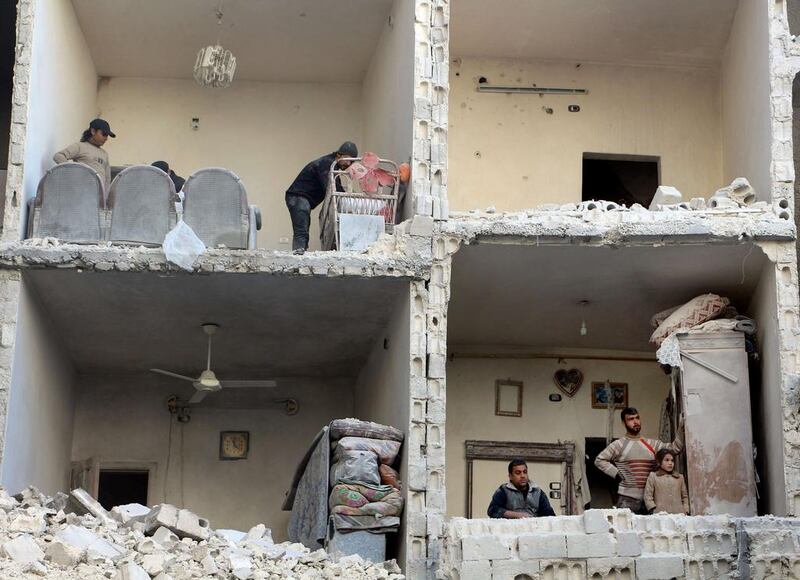ABU DHABI // Syrian rebels and members of the country’s political opposition gather on Tuesday in Riyadh aiming to establish a plan for talks with the Assad regime.
During a three-day meeting, they are expected to try to find a unified message and agree on which individuals will negotiate with the regime’s representatives. The task will be complicated by the factious nature of the various opposition groups who have repeatedly failed to form a united front during five years of conflict.
“Saudi Arabia understands there are differences between these opposition groups, they have many differences,” said Saud Saleh Al Sarhan, a political analyst in Riyadh. “There is no time to waste for them to come up with one voice.”
Saudi Arabia is a main backer of the opposition and in recent months stepped up efforts to bring about an end to the conflict. At least 250,000 people have been killed since peaceful protests in 2011 calling for Syrian president Bashar Al Assad’s removal slipped into civil war. Millions of Syrians have fled to surrounding countries and Europe to escape the fighting and catastrophic humanitarian situation.
Along with various rebel groups, representatives of the Syrian National Coalition, the main opposition umbrella, regime sanctioned dissidents from inside Syria, and members of the Cairo Conference, another opposition coalition, will take part in the meeting in Riyadh.
Extremist militant groups including Al Qaeda-linked Jabhat Al Nusra and ISIL will not attend. Nor will the Kurdish Democratic Union Party (PYD), the most powerful Kurdish political group in Syria.
The PYD was reported to have not been invited because of opposition from Turkey, which is concerned about Kurdish expansion along its southern border.
Munzer Akbik, a member of the Syrian National Coalition, said that it would be difficult to agree on the individuals who will negotiate with the regime. “That is the difficult part and it is really not clear until now,” he said.
He said the opposition should use the time in Riyadh to create a document that committed “all parties in the opposition ... to a political process.”
The latest attempt to find an end to the conflict comes after meetings in Vienna this year between 17 countries including supporters of the opposition and the regime. An agreement was reached that negotiations between the two sides would take place before January 1 and should be followed by a transitional government in six months and elections in 18-months.
The major stumbling block remains the fate of Mr Al Assad. The opposition insists he must not take part in a transition period, while the regime and its backers say that he should stay. “If Assad stays then its not a transition,” said Mr Akbik.
While previous attempts to reach a political solution to the conflict have not gone far, that planning for the talks are happening in Saudi Arabia makes this meeting different, said Mr Al Sarhan, who works for the King Faisal Centre in Riyadh.
“I think Saudi Arabia is the only big Arab country that is supporting the moderate Syrian opposition. These people and these groups know that only Saudi Arabia will take their voice out to the international community,” he said.
Mr Al Sarhan expected the opposition groups would agree on a platform that Mr Al Assad, ISIL, and “other groups” such as Shiite militias fighting on behalf of the regime “are enemies of Syria”.
Iran, a key backer or Mr Al Assad, has slammed the meeting in Riyadh, describing it as violating the agreement reached in Vienna.
Though reaching agreement on key issues such as the fate of Mr Al Assad will be difficult, the upcoming talks appear to be the most serious attempt to end the conflict so far. “There is a momentum now,” said Mr Akbik.
The talks come as the war becomes increasingly international after the extremist group ISIL captured large swathes of territory in eastern Syria and western Iraq last year, prompting a US-led coalition of countries to begin a bombing campaign against the militants.
Russia is also carrying out its own bombing campaign against ISIL and rebel groups in Syria opposed to Mr Al Assad, who Moscow supports.
Last month, Turkey shot down a Russian warplane following a brief airspace violation, causing a dramatic rise in tensions between the two countries.
Ankara is another key backer of the rebels.
jvela@thenational.ae





